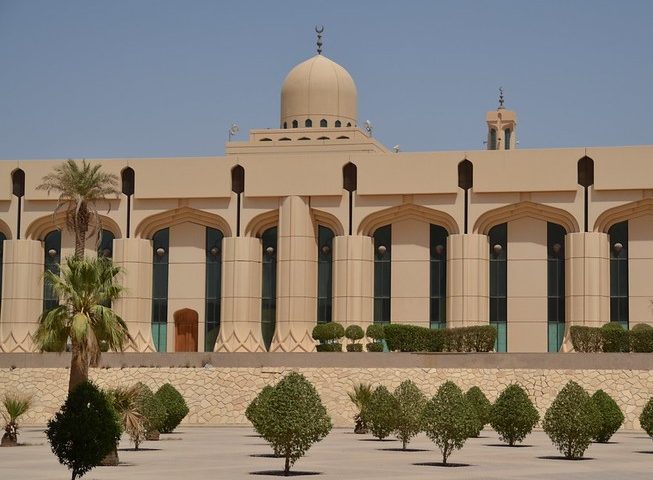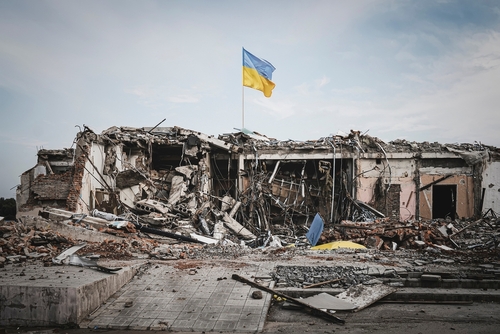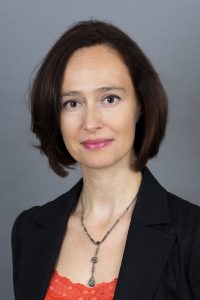 Elsa Bedos, Arabic language specialist and expert in the challenges of evaluating education and research, wrote her thesis on the implementation of processes to develop and certify university courses in Saudi Arabia. Her work was awarded the prestigious Louis Cros prize by the French academy of moral and political sciences in 2020. Interview.
Elsa Bedos, Arabic language specialist and expert in the challenges of evaluating education and research, wrote her thesis on the implementation of processes to develop and certify university courses in Saudi Arabia. Her work was awarded the prestigious Louis Cros prize by the French academy of moral and political sciences in 2020. Interview.
Your graduate research seeks to understand how and why Saudi Arabia implemented a higher education evaluation policy. Why did you pick this topic?
Elsa Bedos: My main goal was that this research work would enable me to progress professionally in my specialist field, which is the administration of higher education and research. I had previously worked for the research and higher education evaluation agency to evaluate universities in France. I then have training courses in Arabic language and civilisation. I have made several trips to the Arab world, some for long periods, such as to Saudi Arabia, for my master of Research degree in comparative sociology. I particularly appreciated one of the professors of my master’s course – Christine Musselin, higher education sociologist – for her class on survey methodology. I liked how she combined high standards with benevolence and I knew that I would be needing guidance throughout my thesis. While talking to her, I discovered the existence of the Saudi Arabian National Commission for Academic Assessment and Accreditation – NCAAA. This was the starting point for my thesis project, which analyses the creation of this commission and its supervisory policy.
This policy fits with a global movement and feeds upon a range of foreign models and tools. Was there a national discussion – and/or within the establishments themselves – about these sources of inspiration? Were these models adapted to the Saudi culture?
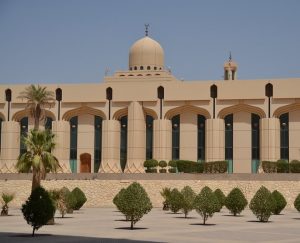
Riyadh – King Saud University – University Grand Mosque. © Stephen Downes; CC BY-NC 2.0, via Flickr
E.B.: In the university where I observed the implementation of this scheme, I showed how it had transformed the administrative structure by creating a new hierarchy based on quality, quality agents and the introduction of teaching procedures. I also noted several simultaneous and intertwined forms of bureaucratisation: rational legal (Weber’s bureaucracy(1)Based on a hierarchical organisation, actions implemented on the basis of written documents, training and qualification of experts, full-time activity in the field, definition of rules and procedures.), managerial (New Public Management – NPM) and rationalised(2) Based on a rationalised, standardised form and having reflective skills, what Philippe Bezès describes as “squared bureaucratisation”. . The introduction of assessment and accreditation tools, inspired by NPM, was described by the quality agents as being a break away from the former bureaucratic system. In fact, these tools, and the accompanying work practices, were an extension of the bureaucratic process, characterised by an increase in written documents and procedures. The quality agents imposed the formal task of writing dossiers and reports.
These processes were supposed to transform the teachers’ pedagogical approach and the university education provided. I proposed to investigate and qualify the Saudi regime based on these practices, using this control as the subject of study. I analysed quality as being related to the way in which practises and discourse can combine elements of both democratic and authoritarian governments at the same time. NPM is primarily a North American and European doctrine; various studies conducted in democratic contexts have shown that the spread of formal control reduces the margins for freedom, and particularly academic freedom. My work shows that in an authoritarian context, which implements political and moral control focussed on individual people and their thoughts, the spread of NPM actually helped to reduce political and moral control. This case finally provides an enlightening overview of public action, the entanglement between instrumental reform, bureaucratisation and methods of government.E.B.: Saudi universities have been international institutions for a long time, through their professors, who are mostly non-Saudis originating from and having been trained in other countries, along with Saudis who have been educated abroad, generally in English-speaking countries (the USA, the UK, Australia, New Zealand, etc.). When the Saudi assessment and accreditation policy was invented in the early 2010s, the academics directing the NCAAA asked consultants from Australia, the USA, Great Britain to study and compare foreign systems.
This use of international expertise and international comparison is not specific to Saudi higher education. It is actually relatively common in Saudi Arabia’s public administrations. Public policies are often planned and developed with the support of international consultants or foreign administrations. In fact, I observed and even collaborated in the development of the research and technology plan (maarifah). In the universities assessed, the people I interviewed were aware of having a process inspired by foreign models imposed upon them. Some regretted the massive importation without adaptation to the Saudi situation, the absence of a gradual, incremental approach to enable the universities to adapt to the new practices and work methods resulting from the assessment. At the time, NCAAA thus became trapped by its own, overly complex, accreditation process, due to its remoteness from the realities of Saudi universities: it was impossible to issue accreditation. This state of affairs had been imported by Saudi ‘couriers’, who were accustomed to participating in international congresses and working with networks of quality assurance technicians, who used the same vocabulary and shared the same beliefs concerning the problem-solving ability of certain public action tools.
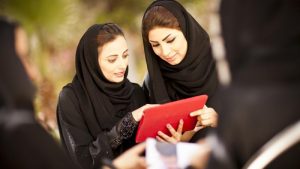
© 2021 British Council
One such tool, learning outcomes, had been particularly deeply integrated because it is supposed to add value to the qualification acquired, guaranteeing the employability of the students and thus reducing the unemployment rates of young Saudis. This importation was due to the involvement of certain key players, such as the British Council in Saudi Arabia, and the UK’s Quality Assurance Agency, with which the NCAAA managers were in regular contact. To resolve the problem of most Saudi universities failing to get accreditation, NCAAA became highly creative, never actually reaching the stage of delivering accreditation. Its managers opted to extend the process upstream, notably through increasingly complex eligibility conditions, and by reorienting its activity to proposing training for the universities to get them used to its assessment-accreditation methods.
One of the challenges was to improve the employability of young Saudis. Was this goal achieved?
E.B.: That is one of the paradoxes of this policy. Those who developed it made a big deal of publicising the goal of improving the higher education system to make Saudi graduates more employable. However, it never once contacted the companies or other public authorities responsible for training people for professional/vocational careers, such as the institution charged with developing non-academic training courses leading to professional qualifications. This situation revealed certain perimeter conflicts between ministries and between administrative authorities. The NCAAA wanted to include within its scope all the training qualifications issued whether they were academic or professional, but it failed to do so.
This reform, launched two years after the Twin Towers attack, also had a number of moral goals. What were they and what did they achieve?
E.B.: I would not use the term moral goals, although it is relevant to recall the context of the discussions on the Saudi higher education reform. This aspect was quickly evacuated and I would say it was more of a desire to respond to what was perceived by Saudi leaders as a political risk of destabilisation, even overturning of the regime, which resulted from accusations, mainly from the USA and Europe and, in a second phase, from Saudi Arabia. The Saudi education system was seen as a ‘public problem’ after the attacks perpetrated in the US in September 2001 (almost all those involved in these terrorist attacks were of Saudi nationality): the system was producing terrorists.
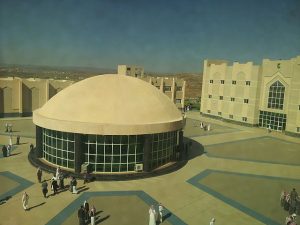
Al-Mahala | King Khalid University. © Abdulaziz Asiri, own work, CC BY-SA 3.0
Saudi government managed, through what is called the sixth ‘national dialogue’, to technicise the problem of the Saudi education system, sliding it from the register of moral values (fighting extremism, developing tolerance) towards more technical and less symbolic aspects: curricula, development of teaching technologies, qualifications and measuring teacher performance, quality assessment. The ‘national dialogue’ provided a public platform to work on ‘relabelling’ Saudi Arabia’s education problem. It went from being a quality problem, expressed in terms of ideological deviance (‘wahhabisme’), to becoming a technical problem. This technicisation was also supported by expert knowledge and linguistic tools: performance, assessment, indicators, ‘good practices’, learning outcomes, quality assurance, benchmarking, etc. With this shift, the operation pacified the discussions, enabling the reorientation of uncertainties – brought into the spotlight by the international crisis that followed the September 11 attacks – and focussing on the quality of the higher education system. The meeting with NCAAA was based on the notion of quality, and assessment and accreditation were the two pillars of this quality. NCAAA set itself up as a quality ‘specialist’, proposing a method for quality assurance.
Although, generally speaking, this type of reform limits academic freedom by multiplying the tools of control, in this case, you show that the ‘ideological’ constraints weighing upon the teachers have actually been reduced. How do you explain this?
E.B.: In the university where I observed the implementation of this scheme, I showed how it had transformed the administrative structure by creating a new hierarchy based on quality, quality agents and the introduction of teaching procedures. I also noted several simultaneous and intertwined forms of bureaucratisation: rational legal (Weber’s bureaucracy), managerial (New Public Management – NPM) and rationalised. The introduction of assessment and accreditation tools, inspired by NPM, was described by the quality agents as being a break away from the former bureaucratic system. In fact, these tools, and the accompanying work practices, were an extension of the bureaucratic process, characterised by an increase in written documents and procedures. The quality agents imposed the formal task of writing dossiers and reports. These processes were supposed to transform the teachers’ pedagogical approach and the university education provided. I proposed to investigate and qualify the Saudi regime based on these practices, using this control as the subject of study. I analysed quality as being related to the way in which practises and discourse can combine elements of both democratic and authoritarian governments at the same time.

© Shutterstock
NPM is primarily a North American and European doctrine; various studies conducted in democratic contexts have shown that the spread of formal control reduces the margins for freedom, and particularly academic freedom. My work shows that in an authoritarian context, which implements political and moral control focussed on individual people and their thoughts, the spread of NPM actually helped to reduce political and moral control. This case finally provides an enlightening overview of public action, the entanglement between instrumental reform, bureaucratisation and methods of government.
However, on the administrative side, these reforms had quite different effects…
E.B.: Indeed. Being concerned with organisational transformations, I observed that the quality agents used the reform for professional promotion purposes, and showed how they constituted a ‘technical legal authority’. By identifying a number of profiles and a multitude of strategies, I revealed the heterogeneity of the quality chain. Academics from Saudi Arabia thus deploy similar action logic, follow similar professional trajectories and use their interknowledge. Non-Saudi academics, on the other hand, develop professional survival strategies. All of them, however, combine academic, administrative and managerial skills. This hybridisation is the central resource of the quality agents in their quest for power within.
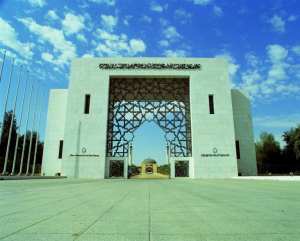
Entrée principale de l’université Mohamed bin Saoud. Source : Facebook de l’université
Were the people you interviewed open and involved?
E.B.: Overall, I was well received. I turned up without making prior contact. Although this is a somewhat uncomfortable situation, experience told me that I would find people to talk to. To start with, you have to meet 2 or 3 people to serve as intermediaries and mediators for the people that you really want to interview. I was therefore put in touch with correspondents at the Saudi assessment and accreditation commission, as well as in several universities of different sizes and with different statuses, some of which played a key role in my networking operation. Nevertheless, there was one moment when I felt quite isolated: the president of the National Commission for Academic Assessment and Accreditation asked me to stop doing interviews and just watch people working. The trust-based relationship was broken after an interview with one of its employees. I had actually thought the interview had actually gone quite well. She had given me lots of interesting material. Luckily, I had already carried out enough interviews when this incident happened. In the end, this obstacle was fortunate, because it forced me to consider the entire process, from the origin of the public policy to its implementation.
As a woman, did you feel that you were taken as seriously as a research interviewer should be?
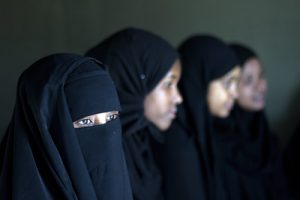
A group of women Saudi returnees wait for their turn to disembark, ©UNICEF Ethiopia/2013/Ayene
E.B.: Male/female segregation is institutionalised in the universities where I conducted my survey, resulting in areas being reserved for one gender or another (one campus for women and one campus for men). For me personally, the segregation rules were applied more or less strictly. Often, it was not until I reached the interview room that I found out whether I was going to be meeting men, women or both. Although gender segregation is institutionalised in public areas once the rules have been defined, there is room for manoeuvre. Saudi intermediaries provided me with access to areas totally reserved for men, male academics accepted to breach the gender segregation rule by meeting me in places where the people involved felt that they could deviate from this norm: the reception areas of large, international hotels, for example, and the university’s medical college, where I spent the most time. The uncertainty in which I found myself also became an opportunity, materialising the possibility of bypassing the rules. After analysis, these experiences revealed sociological mechanisms: the composition of hierarchies applied to nationalities, university grades and professions.
The Western academics that I met thus behaved as if they were not totally bound by the same rules as those imposed on Saudi nationals and other foreigners. They found this transgression normal, both for themselves and for me. The range of reactions to my requests with regard to the segregation rule and its transgression was broader among Non-Western male foreign nationals (Arab or Asian). This not only reflects the hierarchy of nationalities, but also the professional status and political capital of the person that had referred me. It reveals the extent of the interpretation margin surrounding the rules and their transgression, which also explains the unexpected situations that I encountered. All Saudis, both academics and civil servants, agreed to meet me, even in workplaces where no women were present. My status as a Westerner and a researcher helped to build a positive image of Saudi Arabia that was able to bypass the segregation rule to enable a woman to do her job. There was also an attempt to influence my analysis of Saudi society by countering my supposed biases. They were thus trying to convince the ‘West’ of the existence of a Saudi Arabia that is open to discussion and in its way of dealing with women. These experiences show the wide range of possible situations and interpretations of this rule, which is still presented so uncompromisingly, both in Saudi Arabia and abroad. They recall the principle, already highlighted by Durkheim that violation of the rule does not necessarily result in sanctions and that exemption from a rule is perfectly normal. They also show that respecting or transgressing the rule expresses individual strategies, enshrined in socio-political mechanisms that are larger than the rule itself.
Propos recueillis par Hélène Naudet, direction scientifique
Elsa Bedos, associate researcher at the Centre for the Sociology of Organisations (CSO), is also responsible for monitoring scientific activities in the Scientific Direction of Sciences Po and is helping to develop the research dimension of CIVICA – a European alliance of eight universities.
Notes
| ↑1 | Based on a hierarchical organisation, actions implemented on the basis of written documents, training and qualification of experts, full-time activity in the field, definition of rules and procedures. |
|---|---|
| ↑2 | Based on a rationalised, standardised form and having reflective skills, what Philippe Bezès describes as “squared bureaucratisation”. |


